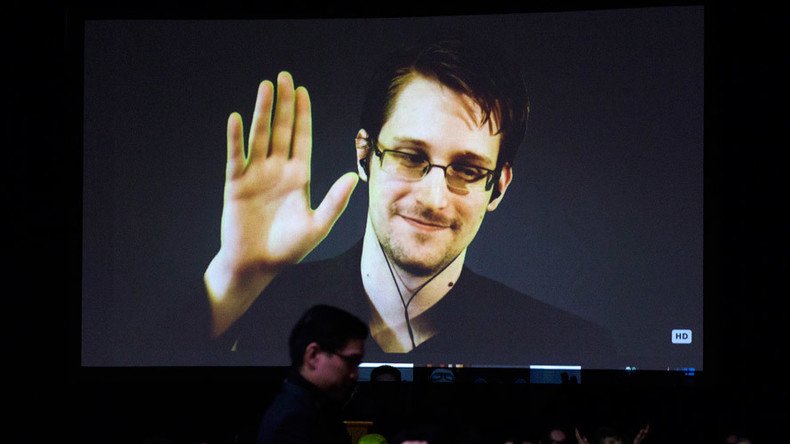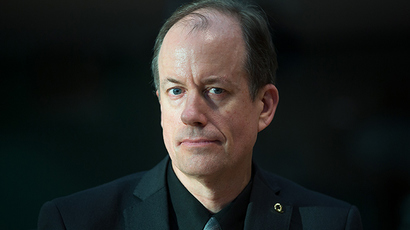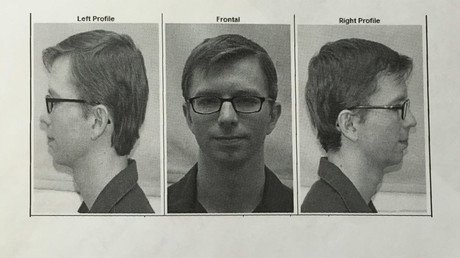Snowden calls for ‘iron-clad protection’ of whistleblowers after new insider revelations

Edward Snowden has called for a mechanism that would guard potential whistleblowers from repercussions and acknowledge their positive role. The former NSA contractor’s proposal comes after a senior Pentagon official shed light on Thomas Drake’s case.
“We need iron-clad, enforceable protections for whistleblowers, and we need a public record of success stories. Protect the people who go to members of Congress with oversight roles, and if their efforts lead to a positive change in policy – recognize them for their efforts,” Snowden told the Guardian while commenting on the story of John Crane, senior Pentagon investigator from 2004 to 2013. Crane revealed that the mechanism aimed at protecting NSA employees who want to blow the whistle from official repercussions does not work.
The experts from the book “Bravehearts: Whistle Blowing in the Age of Snowden” by Mark Hertsgaard, which contain Crane’s firsthand account of how Pentagon had mistreated Thomas Drake and breached the Whistleblower Protection Act were published by the Guardian and Der Spiegel on Sunday.
Explaining his choice to not leave the matter to internal scrutiny, but instead going to the press, Snowden took into the account Drake’s fate.
“Going to the inspector general with evidence of truly serious wrongdoing is often a mistake. Going to the press involves serious risks, but at least you’ve got a chance.”
Crane, who worked at Inspector’s General office from 1988 to 2013 oversaw the case of Thomas Drake. Drake, an executive NSA official, was among the group of whistleblowers cooperating with the IG from 2002-2003 to stop what he deemed to be illegal surveillance of millions of Americans and waste of NSA funds under the program called Traiblazer.
Drake also alleged that the mass surveillance programs were implemented in violation of the fourth amendment of the US Constitution which prohibits warrantless “unreasonable searches and seizures.”
Crane confirmed to the Guardian that investigators at the IG’s office carried out a thorough research and prepared a report which underpinned Drake’s claims and led to the program be eventually scrapped by the Congress in 2006.
“We were concerned about these constitutional issues even before we investigated their complaint. We had received other whistleblower filings that flagged the issue,” he said. During the course of the investigation, Drake provided NSA documents to the IG’s office endorsed to do so by investigators themselves, he claimed.
The exposure of mass surveillance program under George W Bush's administration might remain an internal issue with the names of the group of whistleblowers being disclosed in compliance with the Whistleblower Protection Act. However, after the story leaked to New York Times in 2005, information on Drake was forwarded to the FBI despite the Protection Act’s guidelines, according to Crane.
Snowden laughs off CIA’s ‘mistaken’ destruction of secret torture report https://t.co/VHCaAHKyzEpic.twitter.com/nwh3Yh4IGc
— RT America (@RT_America) 20 мая 2016 г.
“I reached into my breast pocket and pulled out my copy of the Whistleblower Protection Act.” Crane said, referring to his superior Henry Shelly, who served as a general counsel at the office, to disclose the name of the whistleblower. “I was concerned that Henry was violating the law… Henry [replied] that he was the general counsel, the general counsel was in charge of handling things with the Justice Department and he would do things his way,” Crane added.
After the identities of the whistleblowers were revealed to the FBI, the agency searched homes, including that of Drake in 2007. In 2010 Drake was charged under Espionage Act and faced a possibility of 35 years in jail. However, the majority of charges were soon dropped with him being sentenced to a community service and probation.
Crane also recalled that after Drake filed a complaint with the IG's office demanding to provide documents that could serve as an evidence of him cooperating with Pentagon, Shelly told Crane that some junior employees “f****d off” and that the documents were destroyed.
“If we have situations where we have whistleblowers investigated because they’re whistleblowers to the inspector general’s office, that will simply shut down the whole whistleblower system,” Crane stressed, pointing out to the lack of confidentiality in the system.
Commenting on the story, Snowden echoed Drake’s argument, saying that it is impossible at the moment to become a whistleblower within the law as the law is being violated like in the case of Drake.
“If your boss in the mailroom lies on his timesheets, the IG might look into it. But if you’re Thomas Drake, and you find out the president of the United States ordered the warrantless wiretapping of everyone in the country, what’s the IG going to do?” questioned the former NSA employee. “They’re going to flush it, and you with it,” Snowden said.
Washington officials have repeatedly accused Snowden of treason for his decision to go to the media with his revelations, while insisting that he would be secured under the law in the US.
Addressing the case of Snowden at a Democratic presidential debate on October 13, 2015, Hillary Clinton, who was Secretary of State from 2009 to 2013, said “he could have been a whistleblower. He could have gotten all of the protections of being a whistleblower. He could have raised all the issues that he has raised.”















